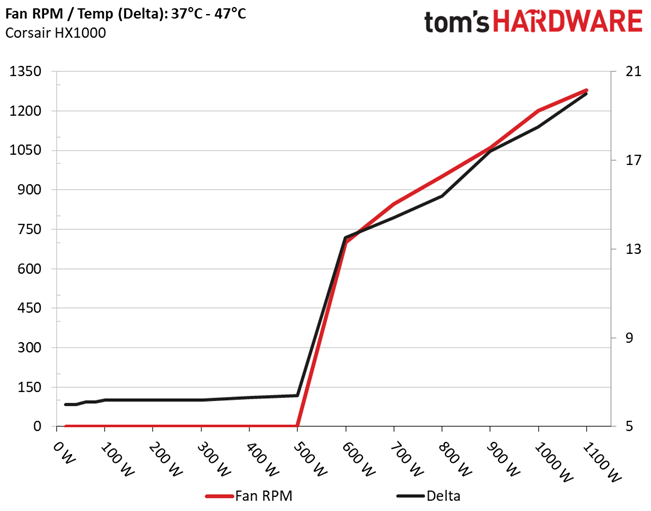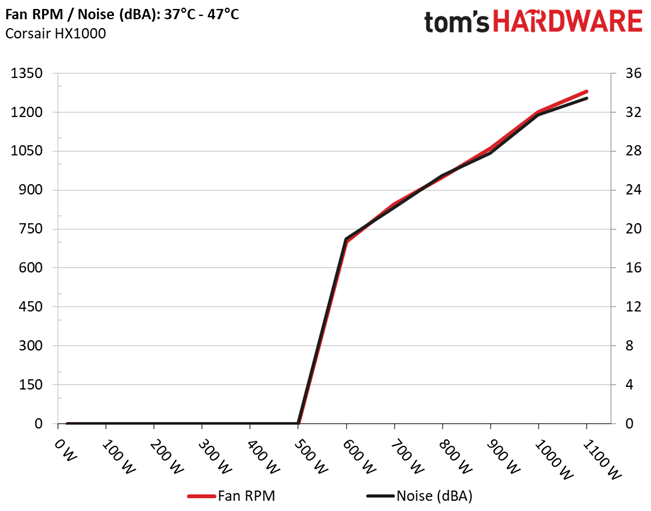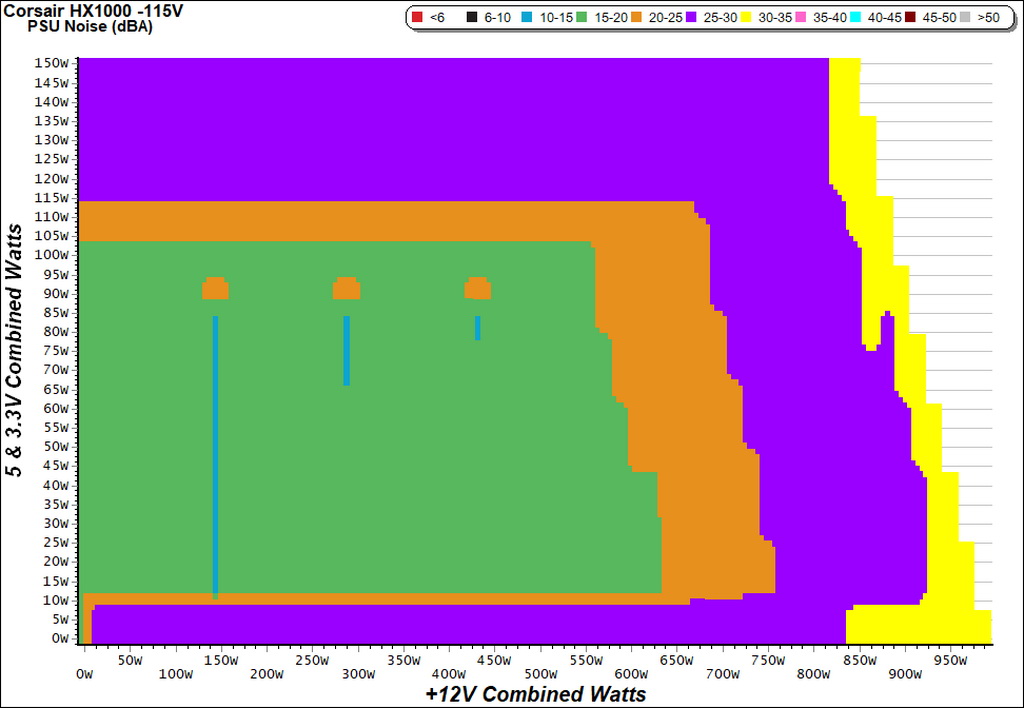Corsair HX1000 PSU Review
Why you can trust Tom's Hardware
Efficiency, Temperature & Noise
Efficiency
Our efficiency testing procedure is detailed here.
Using results from the previous page, we plotted a chart showing the HX1000's efficiency at low loads, and loads from 10 to 110 percent of its maximum-rated capacity.
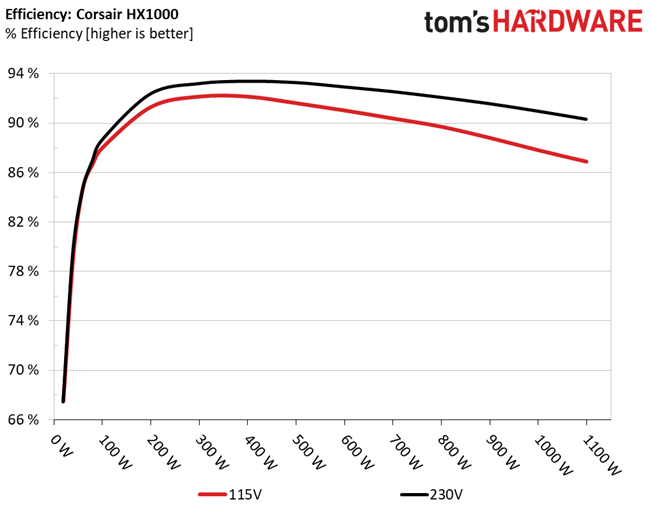
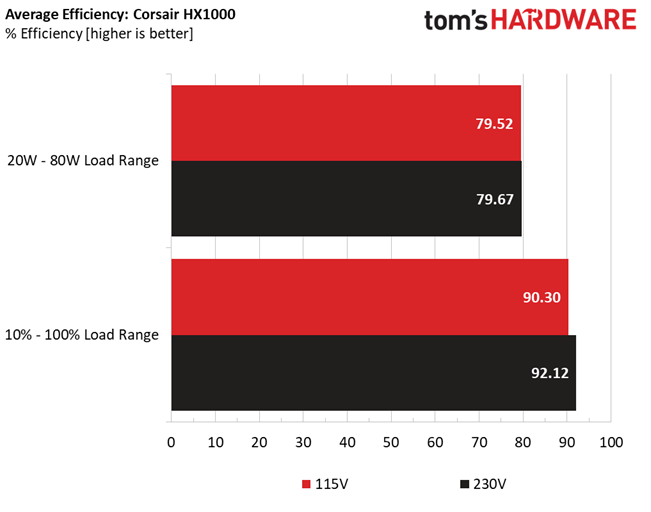
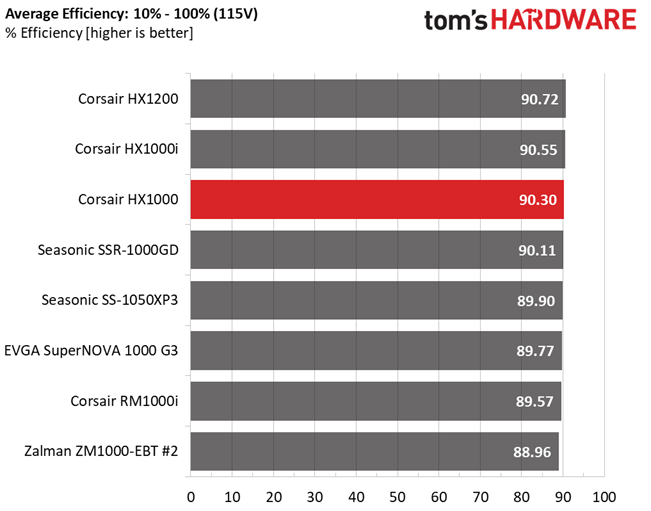
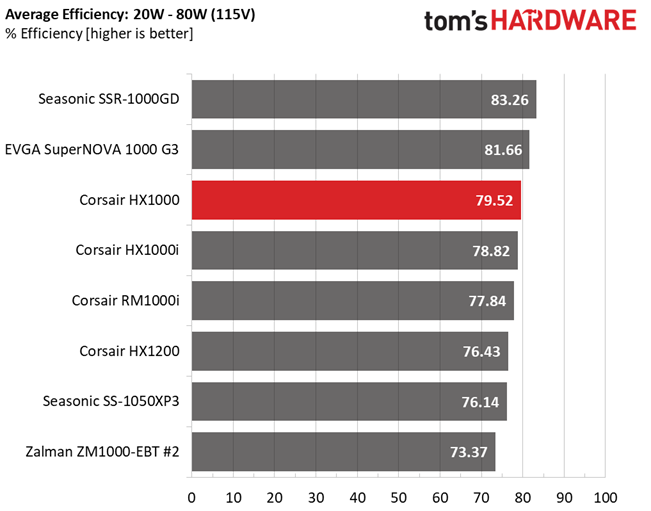
Corsair's HX1000 registers good efficiency levels under both normal and light loads.
Efficiency At Low Loads
In the following tests, we measure the HX1000's efficiency at loads significantly lower than 10 percent of its maximum capacity (the lowest load the 80 PLUS standard measures). The loads we dialed were 20, 40, 60, and 80W. This is important for representing when a PC is idle, with power-saving features turned on.
| Test # | 12V | 5V | 3.3V | 5VSB | DC/AC (Watts) | Efficiency | Fan Speed | PSU Noise | PF/AC Volts |
|---|---|---|---|---|---|---|---|---|---|
| 1 | 1.206A | 0.492A | 0.481A | 0.196A | 19.621 | 67.507% | 0 RPM | <6.0 dB(A) | 0.832 |
| 12.090V | 5.019V | 3.302V | 5.012V | 29.065 | 115.18V | ||||
| 2 | 2.443A | 0.991A | 0.999A | 0.395A | 39.774 | 79.118% | 0 RPM | <6.0 dB(A) | 0.916 |
| 12.087V | 5.017V | 3.300V | 5.006V | 50.272 | 115.18V | ||||
| 3 | 3.675A | 1.488A | 1.512A | 5.001A | 59.853 | 84.781% | 0 RPM | <6.0 dB(A) | 0.963 |
| 12.084V | 5.017V | 3.299V | 5.001V | 70.597 | 115.18V | ||||
| 4 | 4.900A | 1.997A | 1.998A | 0.801A | 79.798 | 86.657% | 0 RPM | <6.0 dB(A) | 0.969 |
| 12.080V | 5.015V | 3.298V | 4.996V | 92.084 | 115.18V |
It would be nice if efficiency was above 70% during our 20W load test. The 80% mark is passed during the last two tests, though. Corsair's fan operates passively throughout our light-load testing.
5VSB Efficiency
The ATX specification, along with CEC, ErP Lot 3 2014 and ErP Lot 6 2010/2013, states that 5VSB standby supply efficiency should be as high as possible, recommending 75 percent or higher with 550mA, 1A, and 1.5A of load. The PSU should also achieve higher than 75% efficiency at 5VSB under full load, or with 3A if its max current output on this rail is higher than 3A.
We take six measurements: one each at 100, 250, 550, 1000, and 1500mA, and one with the full load the 5VSB rail can handle.
Get Tom's Hardware's best news and in-depth reviews, straight to your inbox.
| Test # | 5VSB | DC/AC (Watts) | Efficiency | PF/AC Volts |
|---|---|---|---|---|
| 1 | 0.101A | 0.511 | 76.269% | 0.066 |
| 5.037V | 0.670 | 115.09V | ||
| 2 | 0.252A | 1.267 | 79.535% | 0.149 |
| 5.034V | 1.593 | 115.09V | ||
| 3 | 0.542A | 2.726 | 80.295% | 0.274 |
| 5.028V | 3.395 | 115.10V | ||
| 4 | 1.002A | 5.029 | 80.029% | 0.391 |
| 5.018V | 6.284 | 115.12V | ||
| 5 | 1.502A | 7.521 | 79.790% | 0.456 |
| 5.008V | 9.426 | 115.12V | ||
| 6 | 3.002A | 14.936 | 78.322% | 0.530 |
| 4.976V | 19.070 | 115.12V |
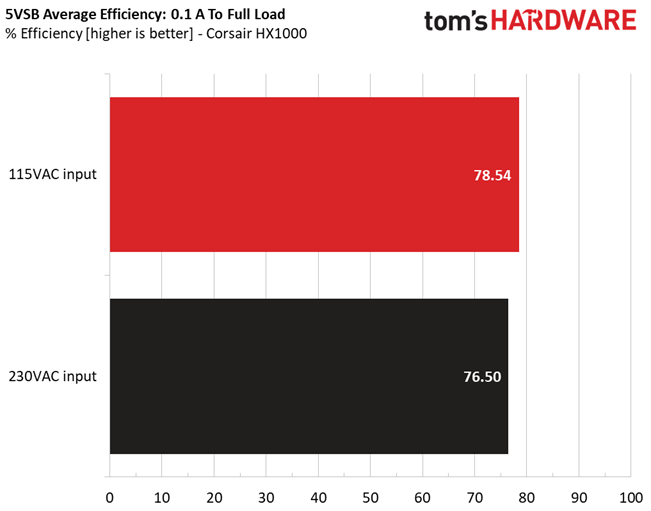
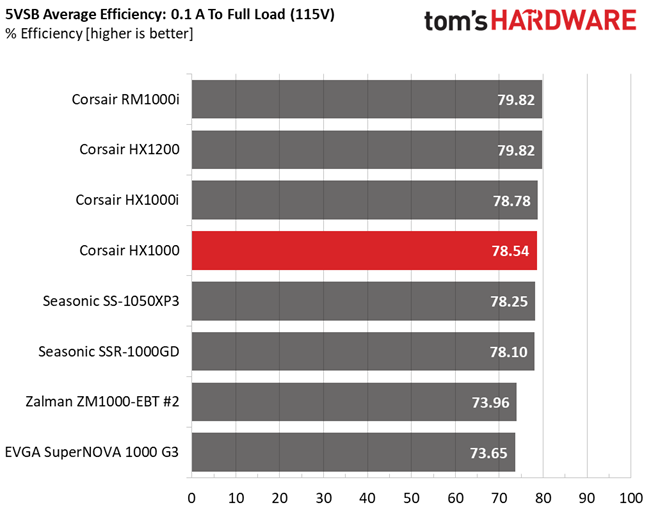
The 5VSB rail achieves high-enough efficiency levels. CWT pays a lot of attention to getting this circuit right, contrary to Super Flower, which doesn't seem to care much about its efficiency.
Power Consumption In Idle And Standby
In the table below, you'll find the power consumption and voltage values of all rails (except -12V) when the PSU is idle (powered on, but without any load on its rails), and the power consumption when the PSU is in standby mode (without any load, at 5VSB).
| Mode | 12V | 5V | 3.3V | 5VSB | Watts | PF/AC Volts |
|---|---|---|---|---|---|---|
| Idle | 12.093V | 5.020V | 3.303V | 5.018V | 8.792 | 0.492 |
| 115.2V | ||||||
| Standby | 0.047 | 0.005 | ||||
| 115.1V |
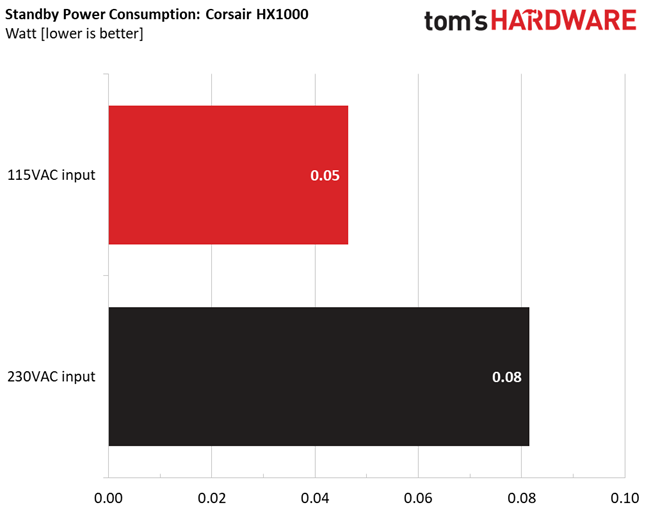
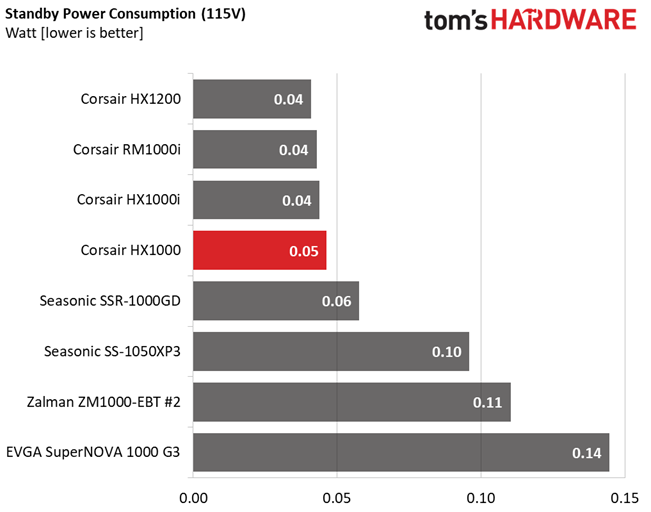
The power consumption at standby is very low with both 115V and 230V input.
Fan RPM, Delta Temperature, And Output Noise
Our mixed noise testing is described in detail here.
The chart below illustrates the cooling fan's speed (in RPM), and the delta between input and output temperature. The results were obtained at 37°C (98.6°F) to 47°C (116.6°F) ambient temperature.
The next chart shows the cooling fan's speed (again, in RPM) and output noise. We measured acoustics from one meter away, inside a hemi-anechoic chamber. Background noise inside the chamber was below 6 dB(A) during testing (actually it is much lower, but our sound meter’s microphone hits its floor), and the results were obtained with the PSU operating at 37°C (98.6°F) to 47°C (116.6°F) ambient temperature.
The following graph illustrates the fan's output noise over the PSU's operating range. The same conditions of the above graph apply to our measurements, though the ambient temperature was between at 30°C (86°F) to 32°C (89.6°F).
The fan profile looks pretty weird. As you can see, the PSU doesn't engage its passive mode, even though our tests are run between 30-32°C. This is because we start with a high load on the minor rails, and it seems like the fan profile is closely connected to the VRMs' output power. Usually, fan profiles are mostly affected by load on the +12V rail, but a majority of CWT platforms mainly take the minor rails into account. That goes for Corsair's HX1200 as well.
MORE: Best Power Supplies
MORE: How We Test Power Supplies
MORE: All Power Supply Content
Current page: Efficiency, Temperature & Noise
Prev Page Load Regulation, Hold-Up Time & Inrush Current Next Page Protection Features
Aris Mpitziopoulos is a contributing editor at Tom's Hardware, covering PSUs.
-
samer.forums Can any one explain to me why we need such high end expensive power supplies for PCs ?Reply
I Overclock my PC fully , and I moved from (seasonic) Bronze grade power supply to Tier one expensive Titanium power supply and I did not gain anything in real life , nothing, Zero. the same performance and the same electric bill and both power supplies never failed.
Sure the better power supply on paper will give better results .. but they are way above the requirement of the PC hardware.
-
turkey3_scratch Reply20248574 said:Can any one explain to me why we need such high end expensive power supplies for PCs ?
I Overclock my PC fully , and I moved from (seasonic) Bronze grade power supply to Tier one expensive Titanium power supply and I did not gain anything in real life , nothing, Zero. the same performance and the same electric bill and both power supplies never failed.
Sure the better power supply on paper will give better results .. but they are way above the requirement of the PC hardware.
Overclocking the CPU is mostly dependent on the motherboard. It can be helped by having a better PSU, because in turn that makes it easier on the motherboard, but I wouldn't expect any major gains from getting a new power supply. I think it also depends on how much your CPU can overclock. People who are really pushing their CPUs to the maximum, they won the lottery and are really pushing it, they may benefit from a better PSU.
Your electric bill is only going to change depending on a lot of factors. Air conditioning and home appliances are going to take up 90% of your electric bill, and because the percentage of that bill making up your computer is so small it can almost be ignored at times. The change is so small that it is not distinguishable between your other household appliances most likely.
And getting a good PSU is not just for trying to help overclocking; a PSU with good performance will usually increase the lifespan of the rest of the computer, and one with bad performance will decrease the lifespan of the hardware. So if you plan on having your computer for many many years a good PSU is a good idea. If you plan on swapping parts every 1-2 years then PSU performance may be a lot less important to you.
Still, expensive PSUs have better build quality so the PSUs themselves are going to last longer, and if they're designed properly like this one they can be very quiet. Cheap PSUs can be loud. -
dstarr3 Reply20248805 said:20248574 said:Can any one explain to me why we need such high end expensive power supplies for PCs ?
I Overclock my PC fully , and I moved from (seasonic) Bronze grade power supply to Tier one expensive Titanium power supply and I did not gain anything in real life , nothing, Zero. the same performance and the same electric bill and both power supplies never failed.
Sure the better power supply on paper will give better results .. but they are way above the requirement of the PC hardware.
Overclocking the CPU is mostly dependent on the motherboard. It can be helped by having a better PSU, because in turn that makes it easier on the motherboard, but I wouldn't expect any major gains from getting a new power supply. I think it also depends on how much your CPU can overclock. People who are really pushing their CPUs to the maximum, they won the lottery and are really pushing it, they may benefit from a better PSU.
Your electric bill is only going to change depending on a lot of factors. Air conditioning and home appliances are going to take up 90% of your electric bill, and because the percentage of that bill making up your computer is so small it can almost be ignored at times. The change is so small that it is not distinguishable between your other household appliances most likely.
And getting a good PSU is not just for trying to help overclocking; a PSU with good performance will usually increase the lifespan of the rest of the computer, and one with bad performance will decrease the lifespan of the hardware. So if you plan on having your computer for many many years a good PSU is a good idea. If you plan on swapping parts every 1-2 years then PSU performance may be a lot less important to you.
Still, expensive PSUs have better build quality so the PSUs themselves are going to last longer, and if they're designed properly like this one they can be very quiet. Cheap PSUs can be loud.
That explains why one would buy high-quality PSUs, sure. But it doesn't explain why one would buy such high-wattage PSUs. Buying a 1000W PSU isn't going to benefit your machine if it only needs 500W on full load.
Now that 3- and 4-way SLI is on the outs, I can only assume it's just the miners that need so much wattage anymore. -
turkey3_scratch Reply20248811 said:That explains why one would buy high-quality PSUs, sure. But it doesn't explain why one would buy such high-wattage PSUs. Buying a 1000W PSU isn't going to benefit your machine if it only needs 500W on full load.
Now that 3- and 4-way SLI is on the outs, I can only assume it's just the miners that need so much wattage anymore.
Well you could take two overclocked 1080Tis, together those can be about 500W. Then if you have one of Intel or AMD's highest-end CPUs overclocked really well, that can be up to 150W probably if they have really good overclocks. Account for other stuff, probably around 725W under load. So in this case some people may buy a 1000W PSU, I don't know. But yeah, I see very few instances where someone would need one.
And some people do believe that buying a bit higher of a wattage will help it last longer. Whether true or not probably depends on a lot of factors like how the fan behaves and efficiency and other stuff.
But usually I like to get a PSU with better build quality and lower wattage than one with slightly less good build quality and higher wattage. -
padrescout It's the same reason Johnny Everyman buys a Dodge Hellcat. Nobody needs a 700 horsepower car to tool around town in. But some people like the image of having it. It implies things without saying anything and generally reflects positively on the owner in their social tribe.Reply
But mostly because a lot of people have more money than brains. -
turkey3_scratch Reply20249162 said:It's the same reason Johnny Everyman buys a Dodge Hellcat. Nobody needs a 700 horsepower car to tool around town in. But some people like the image of having it. It implies things without saying anything and generally reflects positively on the owner in their social tribe.
But mostly because a lot of people have more money than brains.
Assuming everybody buys something for the same reason isn't very reasonable. -
samer.forums Reply20248805 said:20248574 said:Can any one explain to me why we need such high end expensive power supplies for PCs ?
I Overclock my PC fully , and I moved from (seasonic) Bronze grade power supply to Tier one expensive Titanium power supply and I did not gain anything in real life , nothing, Zero. the same performance and the same electric bill and both power supplies never failed.
Sure the better power supply on paper will give better results .. but they are way above the requirement of the PC hardware.
Overclocking the CPU is mostly dependent on the motherboard. It can be helped by having a better PSU, because in turn that makes it easier on the motherboard, but I wouldn't expect any major gains from getting a new power supply. I think it also depends on how much your CPU can overclock. People who are really pushing their CPUs to the maximum, they won the lottery and are really pushing it, they may benefit from a better PSU.
Your electric bill is only going to change depending on a lot of factors. Air conditioning and home appliances are going to take up 90% of your electric bill, and because the percentage of that bill making up your computer is so small it can almost be ignored at times. The change is so small that it is not distinguishable between your other household appliances most likely.
And getting a good PSU is not just for trying to help overclocking; a PSU with good performance will usually increase the lifespan of the rest of the computer, and one with bad performance will decrease the lifespan of the hardware. So if you plan on having your computer for many many years a good PSU is a good idea. If you plan on swapping parts every 1-2 years then PSU performance may be a lot less important to you.
Still, expensive PSUs have better build quality so the PSUs themselves are going to last longer, and if they're designed properly like this one they can be very quiet. Cheap PSUs can be loud.
I never had any power supply fails all my life ... last time I changed a power supply was for low voltage haswell issue and not because my old one died.
Even one of my Plus 80 (below bronze) powersupply lasted 7 years without any issues, I only buy Seasonic by the way and Corsair.
and for motherboards parts , they never failed as well
Life span is not a big deal when you buy a good brand that follow the standard specifications for the pc parts.
I still need a valid reason to convince me that buying an expensive powersupply is better in real life and not on paper. -
turkey3_scratch The original Seasonic-made Corsair HX power supplies from 2008, i.e. one like this, had RMA rated above 10% they were so unreliable (I received this info on the Jonnyguru forums a while back). So really you can't just go by brand. And you may have not had failures personally, but other people have. Personal experience does not dictate the broader spectrum.Reply -
samer.forums Reply20249230 said:The original Seasonic-made Corsair HX power supplies from 2008, i.e. one like this, had RMA rated above 10% they were so unreliable (I received this info on the Jonnyguru forums a while back). So really you can't just go by brand. And you may have not had failures personally, but other people have. Personal experience does not dictate the broader spectrum.
I am not talking about fail rate . I am talking about what I get for paying for high end powersupply and I want to see if they are overkill and not needed at all or not. fail rate is something else. you can get a cheap Bronze powersupply with low fail rate . -
Larmo-Ct For "future proofing", I always buy 1200 Watt PSUs.. As Tim the "Tool Man Taylor" in the old Home Improvement TV show, use to say.. "Mooore poowwerr!! Awh.. Awh..!" :-)Reply
